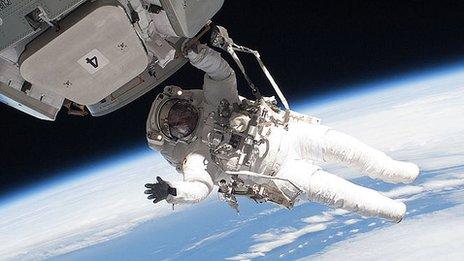Tim Peake: How a British space hero was made
- Published
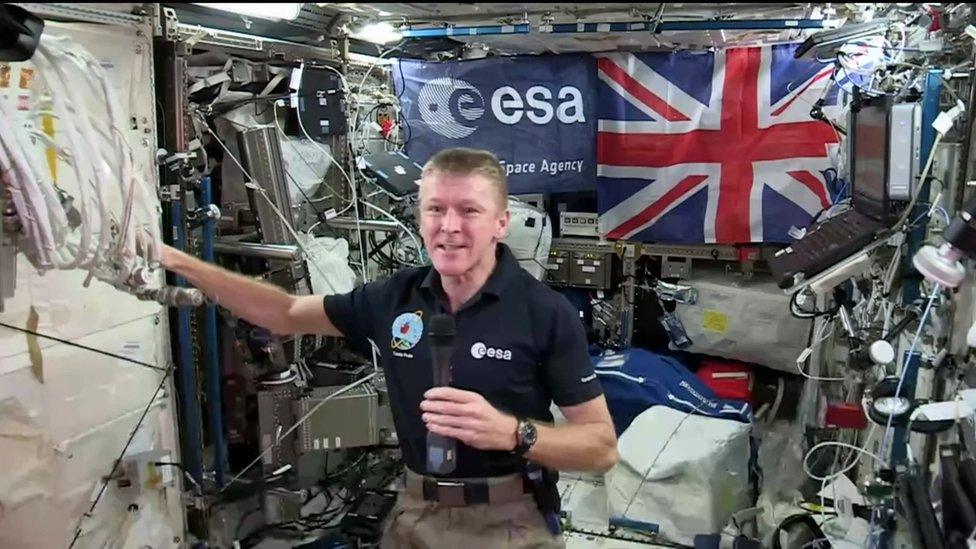
Tim Peake on one of his many link-ups from space
"Who's Tim Peake?"
Just a few months ago, you could have been forgiven for asking that question.
But after a month on the International Space Station, the UK astronaut is rapidly achieving hero status, particularly among children - and adults - interested in science.
From his new home orbiting the Earth, the former Army major has entertained us with the thrills of backwards somersaults and swallowing bubbles of water in the conditions of microgravity.
And he has convinced us that he is only human by accidentally dialling a stranger back on planet Earth.
He's also done some serious work - risking his life to carry out Friday's spacewalk.
British astronaut Tim Peake starts his historic spacewalk and calls it a "proud moment"
As it happened: Tim Peake walks in space
Five things about the spacewalk
Despite the risks of carrying out DIY balanced on a truss 200 miles above the Earth, Tim Peake appeared remarkably calm - even when his spacewalk ended early when his colleague reported water bubbles in his helmet.
Far from routine
Dr Robert Massey of the Royal Astronomical Society says the astronaut has the ability to communicate clearly with people back home while doing risky things.
"Astronauts can make spacewalks look routine," he says.
"Of course they're anything but, and it takes a lot of training and an appreciation of the dangers of space to make it happen.
"Tim has the knack of being able to do risky things like a spacewalk, whilst at the same time calmly and cheerfully telling the British public what he's up to."
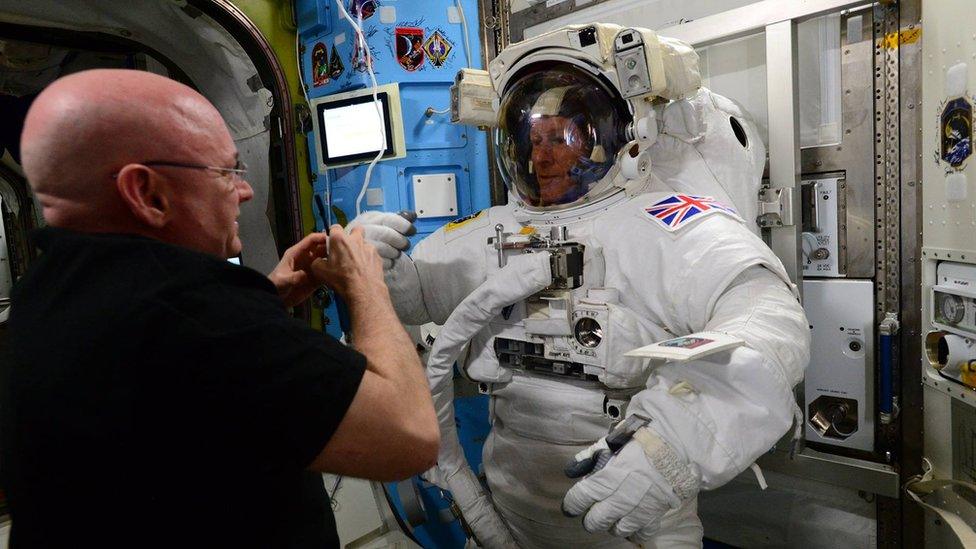
Tim Peake in his spacesuit
Space drama
Half a century has passed since the first human walked in space.
In March 1965, cosmonaut Alexei Leonov ventured outside his spacecraft for 12 minutes.
It was not without drama, as the Russian's spacesuit expanded so much that he was forced to open a valve on the suit to deflate it enough to be able to squeeze back inside to safety.
Since then, about 200 astronauts from 10 countries have completed spacewalks - many of which have proved anything from eventful to downright dangerous.
And Tim Peake and spacewalking colleague Tim Kopra also had a hitch when Kopra's helmet leaked, although Nasa said the crew was never in danger.
Other members of the select group of elite men and women who have looked down at us - with only a thin visor between them and Earth - include Nasa astronaut Michael Foale, Nicholas Patrick and Piers Sellers, who were all born in Britain but moved to the US.
So if living, working and "walking" in space is not exactly new, what is behind Tim Peake's appeal to the British public?
'Just one of us'
Dr Emily Grossman, science communicator, broadcaster and educator, says as well as being a Brit, he is someone we can all relate to.
"He's a natural science communicator," she says. "He communicates in a way which engages a wide audience of all ages."

Esa astronaut Thomas Reiter on a spacewalk
As well as being approachable and playful with a sense of fun, he makes us feel like he is "just one of us", she says, and it is not beyond the realms of possibility that we too could go into space.
"It dispels this image or stereotype of scientists as being distant and aloof," she explains.
"It shows his humanity that he's a real, approachable human being. It will hopefully make school kids feel it could be them next time."
Chris Riley, a film maker and writer specialising in science, says social media has also played a role in Tim Peake's success.
The UK astronaut has followed on from the Canadian astronaut Chris Hadfield in making living in space seem part of our world, he says.
"He's not up there and away from us - he's still part of our community," says Prof Riley.
"He has an extraordinary past - he's exceptional, a high achiever, there's some bravery there, but he seems accessible."
Thinking big
Dr Robert Massey believes space makes us dream - and Tim Peake demonstrates that dreaming big can pay off.
"Astronomy and space often make us all dream a bit," he says.
"Tim Peake's mission - and his spacewalk - are no exception. He's a fantastic ambassador, showing just how far a career in science and engineering can take you.
"Tim's conversations with school students in particular must have inspired a few young people to think about following his path. And even if they don't make it to orbit, thinking big can lead them to do great things."
Follow Helen on Twitter, external.


Tim Peake in space: Want to know more?
Special report page: For the latest news, analysis and video
Guide:, external A day in the life of an astronaut
Explainer: The journey into space and back
Social media: Twitter looks ahead to lift-off

- Published15 January 2016
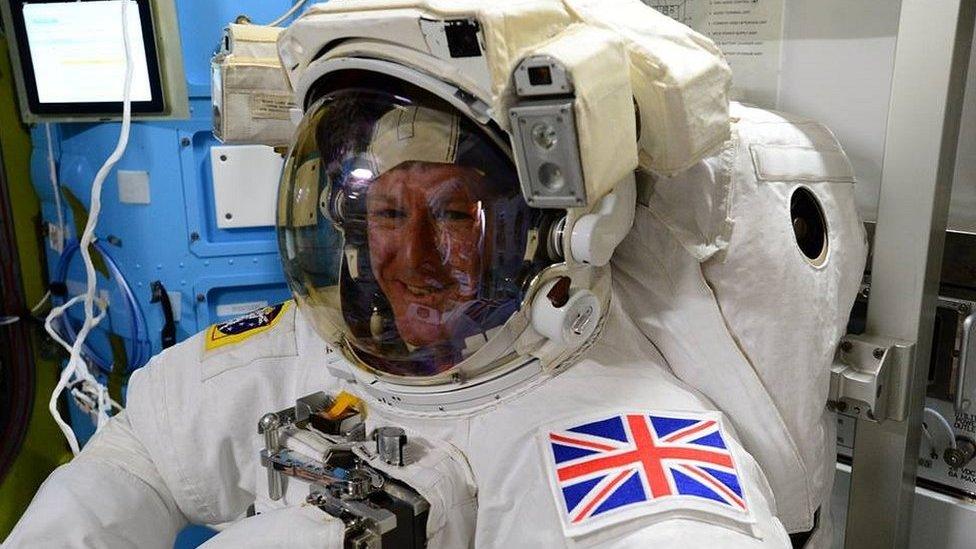
- Published15 January 2016
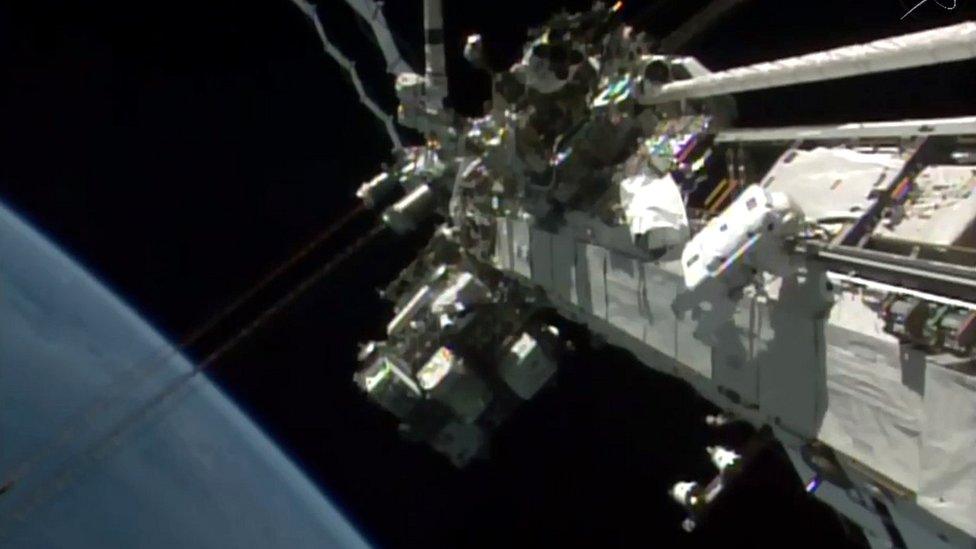
- Published21 November 2011
